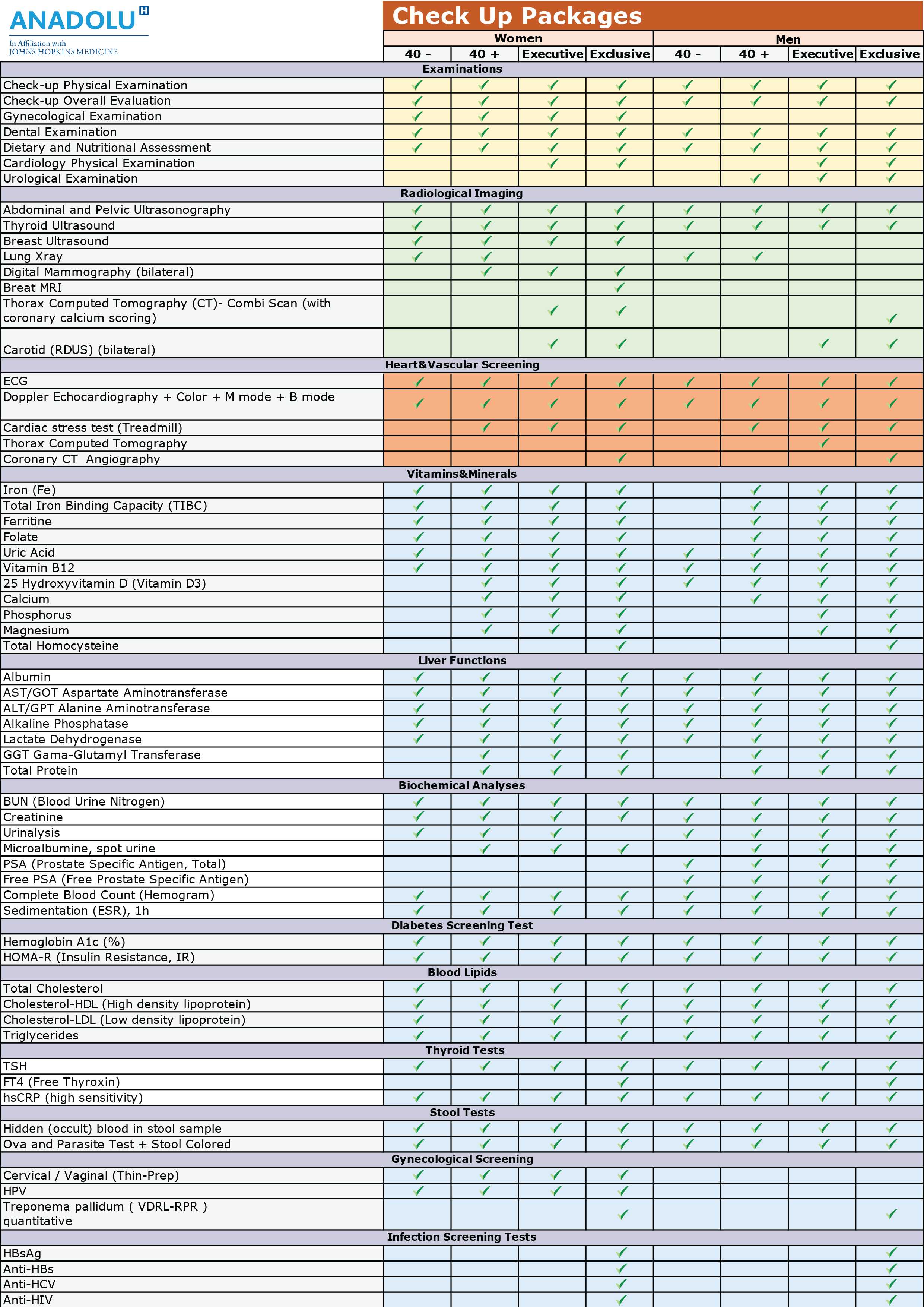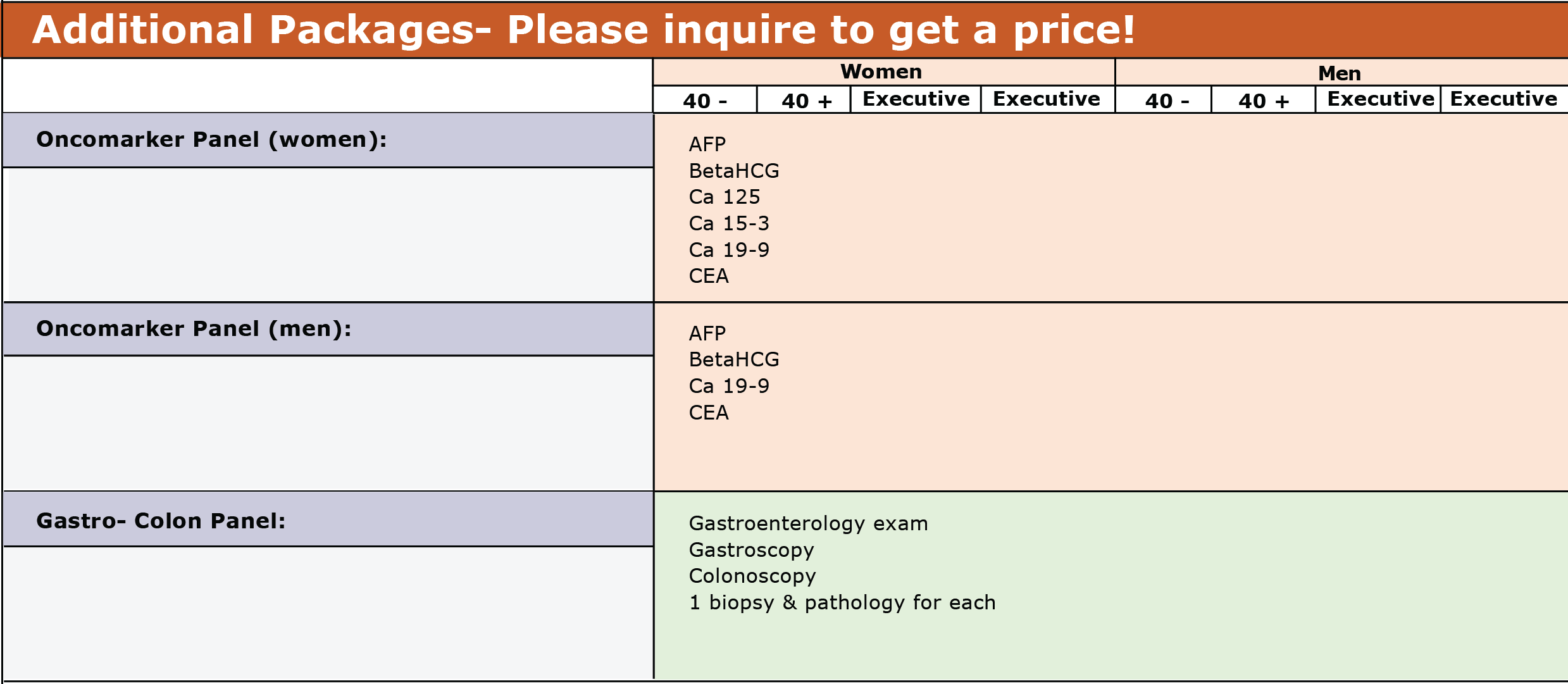+90 537 318 0696
int.patients@anadolusaglik.org


Our Check-up Programs provides you with a wide array of personalized options to enhance your health and well-being.




Most of our check-up programs can be finished in 1 day only, some comprehensive check-up programs take 2 days to complete. You can fly back home the next day!
Medications found in the list below must be stopped at least 3 days prior to your check-up appointment:
Medications that do not need to be stopped prior to your check-up appointment are:
Medications taken for chronic diseases including high blood pressure, diabetes, heart, arthritis, thyroid disease, high cholesterol, psychiatric disorders, neurological disorders.
You may take morning doses of these medications after you give blood for check-up tests.
We recommend you to bring your medications with you.










Check up is a health screening method consisting of physical examination, blood and urine tests and imaging methods. In addition, a full medical investigation is conducted by inquiring complaints, history, background, family history, habits, any regularly-used drugs, and allergic history of persons. In check-up control examination, all data are reviewed, potential risks are identified and proposals for solution are produced.
Check-up procedures are efficiently carried out within a day or two on the designated floor of the Anadolu Health Center.
The check-up examinations encompass the tests specified within the package you will receive. In reality, the question ‘What analyses are conducted during a check-up?’ does not have a singular response, as it varies from one medical institution to another. Typically, it might encompass assessments like blood tests, urine tests, diagnostic imaging procedures, physical examinations, electrocardiograms (ECGs), and spirometry.
Proper preparation is vital to ensure accurate and dependable test results for individuals undergoing a check-up program. Prior to the check-up, it is advisable to be mindful of the following considerations:
Schedule an Appointment: Ahead of the check-up program, individuals should proactively reach out to the healthcare facility to arrange an appointment. Doing so aids in effective time management and facilitates the coordination of the schedule.
Health History and Medications: Before attending the check-up, individuals should compile their health history information. This includes reporting past illnesses, surgeries, medications, and familial health issues. It’s also essential to communicate with the physician regarding any medications taken prior to the check-up.
Fasting: A certain duration of fasting may be necessary before the check-up program, particularly for tests such as blood analyses. As a result, individuals should acquire information about the fasting period and the duration of hunger prior to the check-up.
Alcohol and Smoking: The consumption of alcohol and smoking is discouraged before the check-up program. Smokers are advised to refrain from smoking in the lead-up to the check-up.
Appropriate Attire: Donning comfortable attire during the check-up program is crucial. This contributes to a relaxed physical examination and testing process.
Schedule an Appointment: Ahead of the check-up program, individuals should proactively reach out to the healthcare facility to arrange an appointment. Doing so aids in effective time management and facilitates the coordination of the schedule.
Health History and Medications: Before attending the check-up, individuals should compile their health history information. This includes reporting past illnesses, surgeries, medications, and familial health issues. It’s also essential to communicate with the physician regarding any medications taken prior to the check-up.
Fasting: A certain duration of fasting may be necessary before the check-up program, particularly for tests such as blood analyses. As a result, individuals should acquire information about the fasting period and the duration of hunger prior to the check-up.
Alcohol and Smoking: The consumption of alcohol and smoking is discouraged before the check-up program. Smokers are advised to refrain from smoking in the lead-up to the check-up.
Appropriate Attire: Donning comfortable attire during the check-up program is crucial. This contributes to a relaxed physical examination and testing process.
The check-up program is particularly advisable for the following categories of individuals:
Elderly Individuals: The aging population is susceptible to an array of health challenges. Consequently, individuals aged 65 and above are encouraged to undergo regular check-up programs.
Those with a Family History of Cardiovascular Diseases: Individuals with a familial predisposition to heart diseases should engage in consistent heart health check-ups.
Individuals with Chronic Conditions: Regular health check-ups are crucial for individuals grappling with chronic ailments. Timely detection and treatment of chronic conditions can avert disease progression.
Occupational High-Risk Groups: Certain professions entail inherent health risks within the work environment. For instance, employees exposed to chemicals are advised to undergo workplace health assessments.
Individuals in Good Health: Maintaining one’s well-being involves undergoing a check-up program to promptly identify and forestall potential health issues. The check-up program assumes a pivotal role in sustaining a healthy lifestyle, and it is recommended to partake in it regularly upon reaching a certain age.
It can be asserted that when determining the screening tests to be conducted for specific diseases or health issues, consultation with specialists in the respective field is recommended. For instance, seeking advice from an obstetrician and gynecologist might be necessary for breast cancer screening, while a consultation with a urologist could be pertinent for prostate cancer screening
A check-up does not act as a preventative measure against cancer. Nevertheless, it facilitates early-stage detection, enabling smoother and more effective treatment of the condition.
It is advised not to smoke prior to the check-up program. Smoking can impact certain test outcomes within the check-up regimen, potentially complicating accurate result interpretation.
For instance, smoking can lead to erroneous findings in breathing assessments such as lung function tests. Moreover, smoking may influence blood test results by elevating blood pressure.
It is of vital importance to comply with the following recommendations before check-up to achieve accurate check-up results.
